

Amadioha. Origins[edit] Shrines to Amadioha still exist in different parts of Igboland, but the main shrine is located at Ogboro Ama Ukwu or Ihiokpu as it is called in Ozuzu in Etche Local Government Area of present day Rivers State, Nigeria.
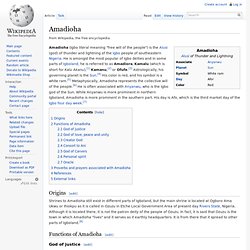
Although it is located there, it is not the patron deity of the people of Ozuzu. In fact, it is said that Ozuzu is the town in which Amadioha "lives" and it serves as it earthly headquarters. It is from there that it spread to other parts of Igboland.[8] Functions of Amadioha[edit] God of justice[edit] Amadioha is first and foremost known as a god of justice. The ritual cleansing for Amadioha is very costly and tasking. Azaka-Tonnerre. Mulungu. Mulungu (also spelled Murungu, Mlungu, and in other variants[1]) is a common name of the creator deity in a number of Bantu languages and cultures over East and Central Africa.[2][3][4] This includes the Nyamwezi, Shambaa, Kamba, Sukuma, Rufiji, Turu, and Kikuyu cultures.[3][3][5] Today, the name "Mulungu" is also often used to refer to the Christian or Islamic God.
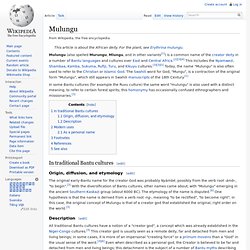
The Swahili word for God, "Mungu", is a contraction of the original form "Mulungu", which still appears in Swahili manuscripts of the 18th Century.[1] In some Bantu cultures (for example the Ruvu culture) the same word "mulungu" is also used with a distinct meaning, to refer to certain forest spirits; this homonymy has occasionally confused ethnographers and missionaries.[3] Oya. In Yoruba mythology, Oya (Alternative spellings: Oiá, Iansã, Iansan), is the Undergoddess of the Niger River.
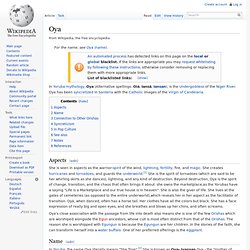
Oya has been syncretized in Santería with the Catholic images of the Virgin of Candelaria. Aspects[edit] Oya's close association with the passage from life into death also means she is one of the few Orishas which are worshiped alongside the Egun ancestors, whose cult is most often distinct from that of the Orishas. The reason she is worshipped with Egungun is because the Egungun are her children. In the stories of the faith, she can transform herself into a water buffalo. Name[edit] In Yoruba, the name Oya literally means "She Tore".[2] She is known as Oya- Iyansan,Oya - the "mother of nine.
" Connection to Other Orishas[edit] She is closely associated with many Orishas, but most especially Chango, Oggun, Oba (Obba), Yewá/Euá and Ochún/Oxum. Oya is said to have a sister named Ayao who is received by some of her initiates. Set (mythology) Set /sɛt/ or Seth (/sɛθ/; also spelled Setesh, Sutekh,[1] Setekh, or Suty) is a god of the desert, storms, disorder, violence and foreigners in ancient Egyptian religion.[2] In Ancient Greek, the god's name is given as Sēth (Σήθ).
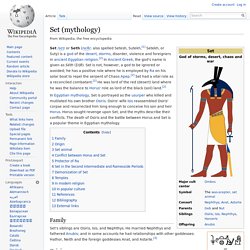
Set is not, however, a god to be ignored or avoided; he has a positive role where he is employed by Ra on his solar boat to repel the serpent of Chaos Apep.[2] Set had a vital role as a reconciled combatant.[2] He was lord of the red (desert) land where he was the balance to Horus' role as lord of the black (soil) land.[2] In Egyptian mythology, Set is portrayed as the usurper who killed and mutilated his own brother Osiris. Osiris' wife Isis reassembled Osiris' corpse and resurrected him long enough to conceive his son and heir Horus. Horus sought revenge upon Set, and the myths describe their conflicts. Shango. Shango statuette This depiction of Shango on horseback has been attributed to the workshop of the renowned Yoruba carver Toibo, of the town of Erin.
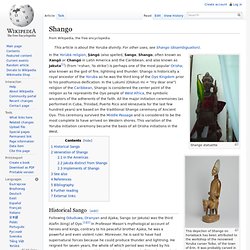
It was probably carved in the 1920s or 1930s for the timi (king) of Ede (one of the historic Yoruba kingdoms), who kept it in a shrine dedicated to the orisha (god) Shango. Equestrian figures are potent symbols of power in many parts of Africa where ownership of horses was long restricted to warriors and political leaders. In Yoruba mythology, Shango was both a king and the orisha associated with thunder and lightning. Figure of a Devotee of Shango Holding an Oshe Shango, Brooklyn Museum In the Yorùbá religion, Ṣàngó (also spelled, Sango, Shango, often known as Xangô or Changó in Latin America and the Caribbean, and also known as Jakuta[1]) (from '=shan, 'to strike') is perhaps one of the most popular Orisha; also known as the god of fire, lightning and thunder.
Historical Sango[edit] Xevioso.